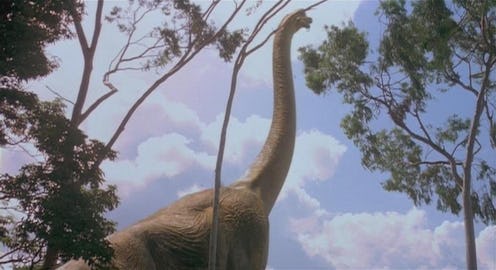Entertainment
Why Can't Steven Spielberg Movies Be Sequelized?

Twenty-two years after the release of the very first film that would spawn a franchise, Jurassic Park holds strong as one of modern cinema’s most beloved brands. It still holds that title despite the fact that 75 percent of the franchise has seen critical failure, proving that Steven Spielberg’s original picture was terrific enough, and perhaps uniquely so, to still be considered an amazing movie despite disappointing follow-ups like The Lost World: Jurassic Park, Jurassic Park III, and this weekend’s latest critical folly. Jurassic World is the fourth Jurassic Park film, the third attempt at a sequel to the 1993 sensation, and the third suggestion that we should just be happy to look back upon that first exploitation of dino DNA. Perhaps we should finally leave the franchise be.
The Jurassic name is hardly Hollywood’s sole victim of excess sequelization — we find ourselves lamenting the studios’ reliance on familiarity now more than ever, making Jurassic World seem less like the symptom of a bad franchise and more like a symptom one of a Hollywood epidemic. But while I might complain that there are no original ideas in Hollywood, I can’t help but celebrate some new buds sprouting from extant branches. Take the year’s most emphatically endorsed film to date: Mad Max: Fury Road, spawning from a source 14 years older than Jurassic Park, and one not without its in-series slip-ups. (Granted, Max Max Beyond Thunderdome is not quite as maligned as Jurassic Park III. But what is?)
Epidemic aside, there are good sequels to be drawn from old favorites. But should just anything be subject to the method? Can everything be sequelized? The same diplomacy that begs us to keep an open mind before we've seen any new film for ourselves begs us to say, “Sure, why not?” But endurance of Spielberg’s return to the premise in Lost World, Joe Johnston’s take on the material in Jurassic Park III, and now Colin Trevorrow's CGI- and Chris Pratt-laden Jurassic World has us wondering if there is any potential left over in the “Life finds a way” mythology to transform into additional feature films. And if not, why?
The foremost answer is one we’ve likely heard entertained in the form of a joke: Why the hell do people keep building dinosaur theme parks?! While this seems like a flippant rejection of the film's plot from the ground up, it’s actually a dutiful observation in the first movie’s thematic conclusion. Jurassic Park might not sport the “Don’t tamper in things you don’t understand” mentality that a less wondrous film would, but it certainly asks the audience to maintain a reverence for the elements that fascinate us, and, furthermore, a conquest for said understanding before all else.
Each of the movie’s characters reach spiritual completion, and everybody ends precisely where he or she should. It’s the nature of Spielberg to treat his heroes (and even his villains) to this sort of fate; his embrace of whimsy as a due combatant to any sort of conflict allows for a consistent treatment of completion across his filmography.
For this reason, none of Spielberg’s movies have ever been truly successfully sequelized. Jaws was followed by three of its own lackluster bastardizations. Raiders of the Lost Ark spawned two significantly more successful follow-ups, albeit ones that aren’t quite looked upon with the same delight as the 1980 original. In fact, Spielberg hated Temple of Doom (and Last Crusade was all sorts of silly).
It’s tough to imagine Jaws, Raiders, and, of course, Jurassic Park sequels that would feel quite as impressive as the even in the wake of well-oiled premises. It’s the undercutting of Spielberg’s magnificent sense of completion, a tragically necessary behavior of any sequel, that turns out disappointment each time around. Spielberg’s mastery in developing self-contained, charmingly conclusive characters could well be the chief reason that Indy, Brody, and that damn T-Rex just never quite worked after their first entries. It’s not the fact alone that their stories were so much fun to watch the first time around, but that they were so much fun to watch end.
Image: Universal Pictures (2); Warner Bros; Paramount Pictures